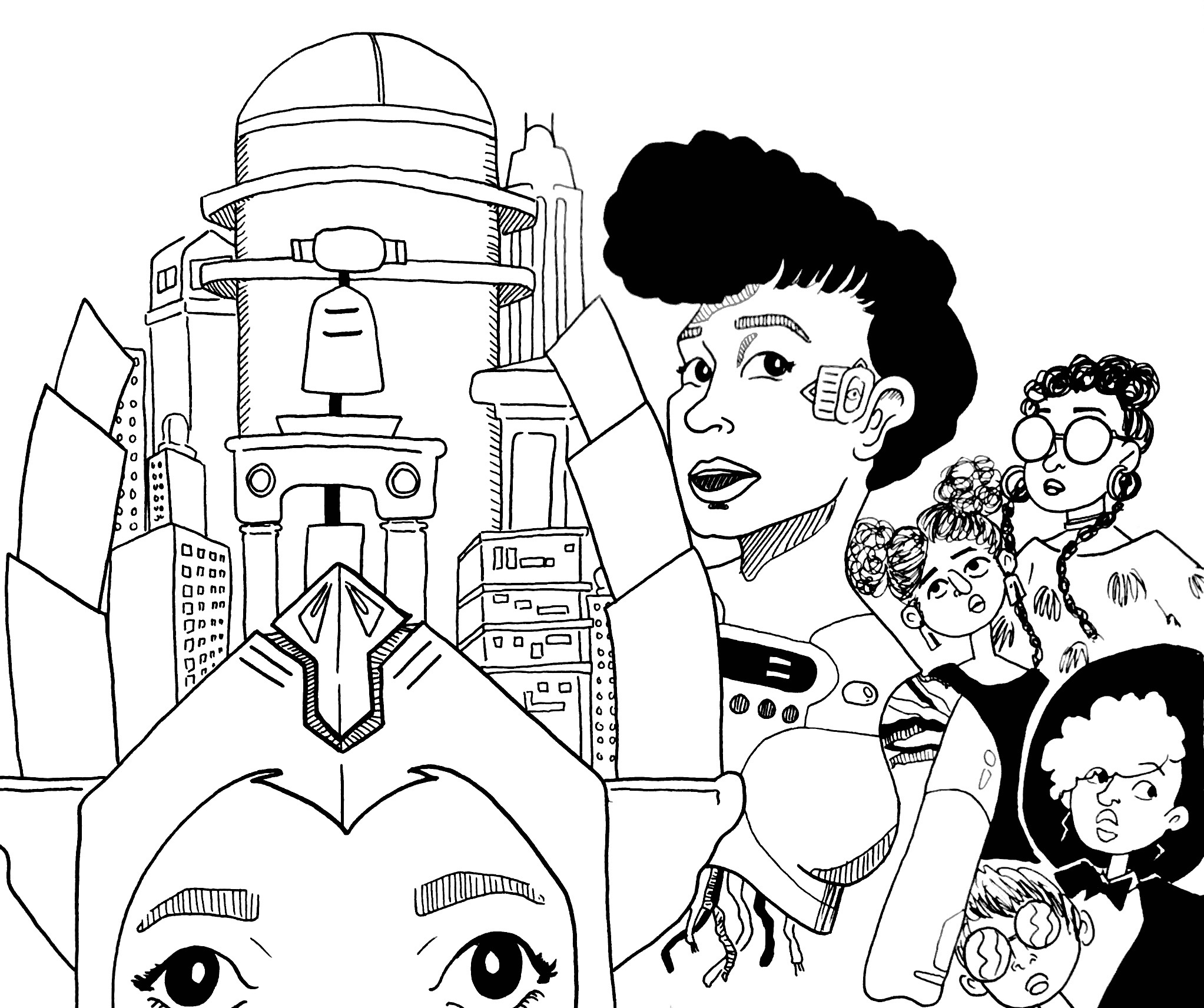Giving Janelle Monáe her flowers, several years too late
It’s fitting that the concept of Afrofuturism had such a moment this Black History Month, allowing us to honor black tradition while also focusing on the road ahead, in more ways than one. Marvel’s transformative Black Panther movie as well as the accompanying album produced by Kendrick Lamar deservedly dominated much of the conversation, but for many who saw the film in theaters, the feature wasn’t the only brilliant Afrofuturist creation on display, thanks to singer and actress Janelle Monáe and the trailer for her upcoming album Dirty Computer.
When the album drops in April, it will have been nearly five years since the talented singer released the critically acclaimed The Electric Lady in 2013, the fourth and fifth installments of her extensive Metropolis concept. She’s been the furthest thing from a recluse in that lengthy time span, however, starring in the groundbreaking film Hidden Figures and impressing as a supporting actress in 2017 Best Picture winner Moonlight. But it’s her music that’s distinguished her as an exceptional creative far ahead of her time, and the reason her next release should spark heavy anticipation in the coming months.
Monáe launched the (as of now) seven-act saga in 2007, with her debut EP “Metropolis: The Chase Suite.” The EP was the genesis story of Monáe’s android alter-ego Cindi Mayweather, sentenced to disassembly after breaking her robot community’s golden rule by falling in love with a human. While fleeing captivity, she discovers that she is the prophesized savior tasked with freeing the androids from human dominion and uniting the two races, and struggles over the decision on her debut album The ArchAndroid before finally returning home to lead the revolution in The Electric Lady.
Like far too many other music fans, my knowledge of Monáe’s catalogue has been mostly limited to scattered songs that were playlist favorites, but lacked context within the larger narrative. The first time I heard her music wasn’t even by conscious choice; rather, it had been a byproduct of my middle school obsession with NBA Live `09, the soundtrack to which included the funky “Violet Stars Happy Hunting!” off her debut EP. As future studio albums trickled into the ecosphere, select singles would somehow nudge their way into my library: The Big Boi-assisted “Tightrope” floored me with outstanding percussion that hit harder than that of an HBCU drumline, and “Primetime” featuring Miguel would soundtrack many late-night smoke sessions freshman year and beyond.
As irresistible as songs like these became, out of neglect, laziness or simple forgetfulness, I never managed to fully dive into Monáe’s android-filled universe of Metropolis. That oversight was finally corrected this February, first out of a long-stifled interest in her narrative, then out of an urgent compulsion to be on track with her story in time for Dirty Computer’s arrival.
Long before blending musical styles became the norm in recent years, Monáe’s albums were transcending traditional boundaries, seamlessly and effortlessly. Attempting to categorize the nearly three-hour journey into a single genre or even art form is remarkably futile; the trilogy is reminiscent of a libretto to an adventure-packed theater musical, highlighted with cinematic elements that build the project into an immense scope.
Rather than mold the albums around a specific sound, Monáe prioritizes the story above all else, and taps into whatever style is best suited to make each plot point resonate with her listeners. The direr Cindi’s circumstances, the faster the drum beats to accordingly raise the stakes of the moment; contrasting this, serene odes to love such as “Say You’ll Go” slow the tempo and minimize the intensity to instead allow her passion to hold increased weight.
Monáe’s poignant political compass plays a role as well, most overtly in songs such as “Sincerely, Jane” where she sheds her robotic alter ego to address the listener directly: “Are we really living or just walking dead now?” she asks over dignified production that marches along with her as she protests injustices throughout the song.
Even when she masquerades as Cindi, the very framework of her futuristic world questions social themes as well, with the second-class android race symbolizing the people of color she feels a responsibility to liberate and empower.
In terms of the sheer magnitude of her artistic concept, Childish Gambino and his character of “the boy” are the only fitting parallels that come to mind, with him being another creative who invented an alternate reality that evolves and expands across several albums. It’s a fair comparison for several reasons: Both Monáe and Donald Glover, the man behind Childish Gambino, have committed to simultaneously building careers outside of music, and both are ahead-of-their-time black artists with countless members of the younger generation looking to them for inspiration.
Waiting two months to hear the next installment of Monáe’s Metropolis series might not be easy, but as something to look forward to beyond Black History Month, it’s just another reminder that black excellence isn’t constrained to a single month, or even to history — it’s simply an ongoing fact of life.
Why I’m smiling: Towkio – WWW.
The road to the debut album has been painstaking for the SAVEMONEY rapper, who released his first EP ‘Community Service’ in 2012. Never one to shy away from risking life and limb in the name of his art — the video for “Drift” sees him hanging out the passenger window while his turbo-charged car drifts through the roads of Hawaii — Towkio promoted the new WWW. by launching himself 100,000 feet into space using a massive helium balloon, releasing the album from outside the atmosphere before falling back to Earth in his capsule. While certainly dangerous and probably unnecessary, it was also the perfect way to grasp “The Overview Effect” of looking down at Earth from outer space, which Towkio says inspired his approach to the album. Kudos for the passion, especially when the music itself is already more than compelling.
Why I’m shaking my head: Rakim’s manager washes hands of tweet condemning current generation of hip-hop
Legendary New York rapper Rakim was back in the news last week after his Twitter account announced “the death of poetry and smoothness” in the modern realm of hip-hop, but anyone searching for the tweet today (or anything at all, aside from two retweets separated by seven years) will come up empty. Less than an hour after DJBooth reached out to Rakim’s camp about the tweets, virtually all of the page’s history was wiped, and Rakim’s manager emailed the blog to say the account was run by a third party rather than the rapper himself. It’s still unclear whether DJBooth’s question actually sparked the mass deletion, but it’s good to know that the “God MC” isn’t wagging a finger at the young rappers looking to carry the torch in his wake.
Why I’m hopeful for the future: Lil Skies says he won’t be using Xanax or lean
Lil Pump’s Twitter declaration in 2017 that “Xanax is the wave” was unfortunately the truth for much of the year, but now that the surge has passed, it seems hip-hop is ready to watch it ebb back out to sea. The aforementioned SoundCloud rapper rang in the new year by announcing that he was through with the destructive opioid, and now newcomer Lil Skies is swearing off the drug before he’s even tried it. The rapper recently sat down with French outlet Rap Fire Officiel to talk about his music, and had a brutally honest answer for why he doesn’t plan on using: “I’m scared, bro.” Sometimes, instead of lengthy think pieces and well-researched studies, three words is all it takes to drive the message home.
Kenan Draughorne is a junior majoring in journalism. He is also the lifestyle editor of the Daily Trojan. His column, “To Pen a Butterfly,” runs Mondays.


